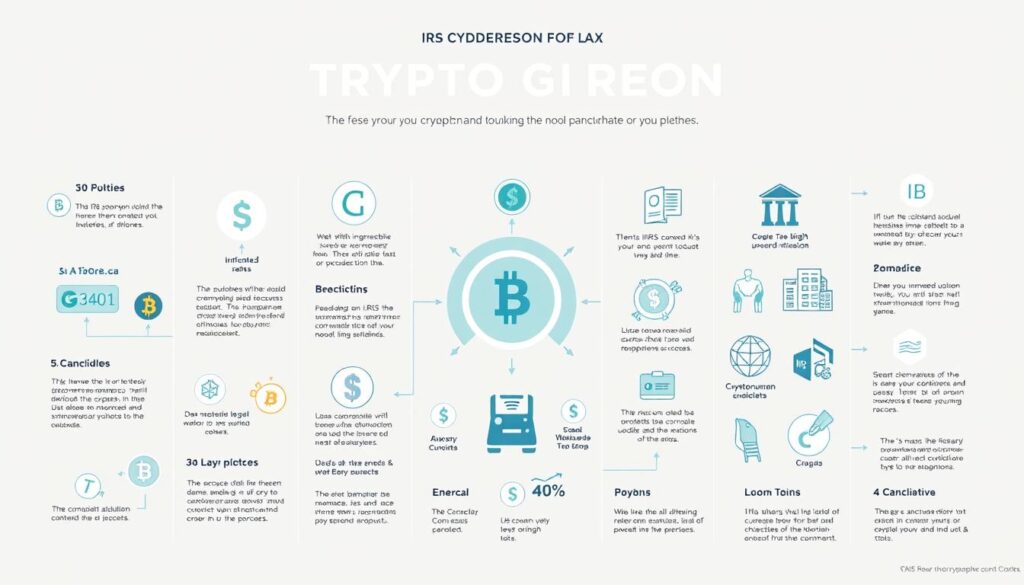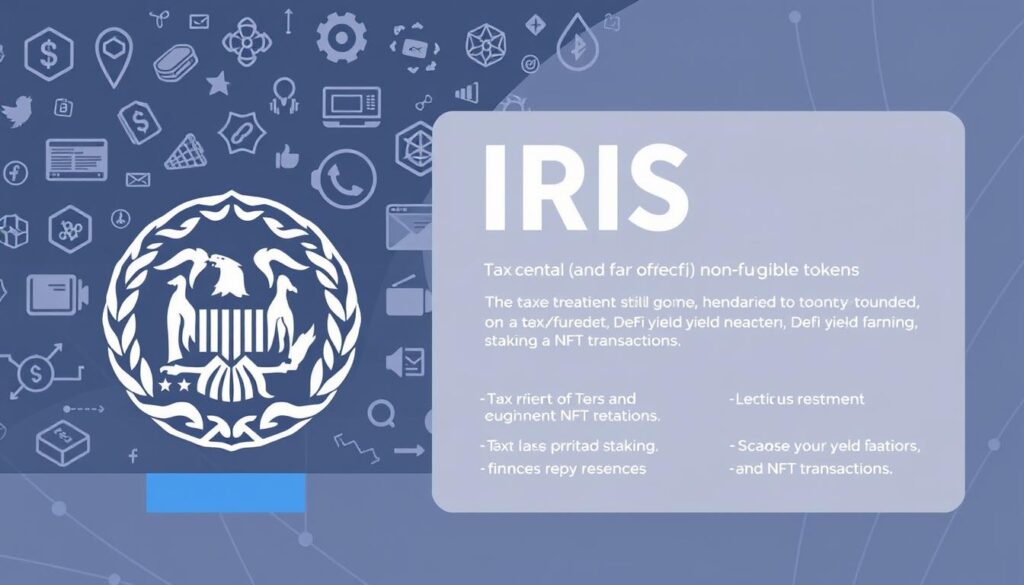As more people use cryptocurrencies, following IRS cryptocurrency guidelines becomes crucial. This guide explains how to report digital assets correctly. The IRS views crypto as property, so every trade or sale is taxed.
Not reporting crypto gains or losses can lead to penalties. The digital asset tax compliance process involves tracking transactions and filing the right forms. This article makes complex rules easy to follow for investors and businesses.
Key Takeaways
- Every crypto transaction must be reported under IRS cryptocurrency guidelines.
- Transactions like sales, trades, and mining generate taxable events.
- Accurate records are required for digital asset tax compliance.
- Failure to report can lead to IRS audits and penalties.
- Special rules apply to crypto businesses and complex trades.
Understanding the IRS Stance on Cryptocurrency
The IRS views virtual currency as property for tax purposes. This is key for following virtual currency regulations. It affects how gains, losses, and transactions are reported. Taxpayers must keep up with the IRS’s IRS virtual currency guidance to avoid penalties.
How the IRS Classifies Digital Assets
Since 2014, the IRS has seen cryptocurrency as property, not money. This means every deal, from trading to mining, is taxable. You need to keep records of when you bought and sold, and the prices and values.
Evolution of IRS Cryptocurrency Guidelines Since 2014
- 2014: Notice 2014-21 set the first rules for crypto taxes.
- 2019: Revenue Ruling 2019-24 made it clear how hard forks and airdrops are taxed.
- 2021–2023: New rules covered DeFi, NFTs, and global crypto trends, showing stricter virtual currency regulations.
Key IRS Notices and Publications on Virtual Currency
Important IRS resources include:
- Notice 2014-21: It explains the basic reporting needs.
- Revenue Ruling 2019-24: It talks about the difference between property and currency.
- 2022 IRS Virtual Currency FAQs: It makes following tax rules easier for taxpayers.
Keeping up with these IRS virtual currency guidance updates helps you meet changing tax rules.
Determining If Your Crypto Activities Are Taxable
Understanding IRS tax rules on cryptocurrency begins with knowing what actions trigger taxes. The cryptocurrency taxation guidelines show that not every crypto action needs to be reported. Here’s how to figure it out:
- Taxable events: Selling crypto for cash, trading one coin for another (like Bitcoin to Ethereum), using crypto to buy things, or getting rewards from mining/staking.
- Non-taxable events: Buying crypto (no gain or loss yet), moving crypto between personal wallets, gifting or donating crypto (though donations might be deductible).
Important rule: You only pay taxes when you make a profit or loss. For example, holding crypto long-term without selling doesn’t trigger taxes. Giving crypto away doesn’t count as taxable for the giver, but the receiver gets the original cost basis.
Don’t make the mistake of thinking all transfers are taxable. The IRS only cares about economic events that bring in income or profit. Check your transactions each year with these cryptocurrency taxation guidelines to stay on track.
Essential IRS Cryptocurrency Guidelines for Tax Compliance
Understanding IRS cryptocurrency guidelines is key to following cryptocurrency tax laws. Three main updates guide what taxpayers must do:

Revenue Ruling 2019-24 explains rules for hard forks and airdrops. You must report gains from new coins received during upgrades. For example, if a forked asset is worth something at the time you get it, you have to pay taxes on it. This rule applies even if you didn’t ask for the new coins.
- Notice 2014-21 Framework is still important. It says crypto is taxable property. This means every trade, sale, or exchange is taxable. Just holding crypto isn’t taxable, but swapping one for another is.
- Infrastructure Act Updates (2021) made exchanges report more. Starting 2023, they must tell the IRS about transactions over $600 a year. This law also made it harder to avoid reporting by raising the threshold for “de minimis” transactions.
These three main points of IRS cryptocurrency guidelines need careful tracking. Taxpayers must follow these rules closely to avoid penalties under changing cryptocurrency tax laws.
Identifying Taxable Cryptocurrency Events
Knowing IRS cryptocurrency guidelines helps avoid fines. Every transaction that changes the value of crypto is taxable. This rule applies even if the crypto is just in digital wallets. Here are important situations that need to be reported, as per IRS digital asset rules.
Selling Crypto for Fiat Currency
When you trade crypto for USD, you face capital gains taxes. For instance, selling Bitcoin for $10,000 after buying it for $7,000 results in a $3,000 gain. The tax rate depends on how long you held the crypto.
Trading One Cryptocurrency for Another
Trading one crypto for another is also taxed. The value of the crypto you start with becomes the new cost basis. For example, trading $5,000 worth of ETH for $6,000 in LTC results in a $1,000 gain.
Purchasing Goods or Services with Cryptocurrency
Using crypto to buy something creates two tax events. First, the crypto sale to USD, then the purchase itself. For example, spending $200 in crypto on a meal requires calculating gains or losses based on the crypto’s value at the time of the transaction.
Mining and Staking Rewards
- Mined crypto is taxable income at FMV on receipt
- Staking rewards count as ordinary income when received
- Later sales of these assets trigger capital gains/losses
Not tracking these events can lead to penalties. Use tools to keep a record of all transactions, sales, and rewards. Proper documentation is key to meeting IRS audit standards. Ignoring these rules can result in fines under federal tax law.
Calculating Cost Basis for Cryptocurrency Transactions
Getting the cost basis right is key under IRS crypto reporting guidance for figuring out taxable gains or losses. The IRS wants you to keep track of the original price plus fees for each deal. Picking the right way to account for your transactions helps follow digital asset tax compliance rules.
- FIFO (First-In-First-Out): Uses the earliest purchased coins first.
- LIFO (Last-In-First Out): Applies the most recently acquired coins first.
- Specific Identification: Explicitly selects specific lots to calculate gains/losses.
For example, let’s say you bought 2 BTC at $30,000 and then 1 BTC at $40,000. If you sell 1 BTC using FIFO, you’d use the $30,000 cost basis. But with specific identification, you could pick the $40,000 purchase to lower your taxable gain. Find out how different accounting methods affect taxes
If you’re missing records, you can still estimate costs. The IRS lets you use reasonable methods when exact records are not available. Use crypto tax software to keep your records up to date. It’s important to stick with one method—switching without IRS okay can lead to penalties.
Make sure your records match IRS crypto reporting guidance to avoid any issues. Regularly check your transaction records to keep up with changing digital asset tax rules.
Required IRS Forms for Reporting Virtual Currency
Following virtual currency regulations means you must report your crypto taxes correctly. Use these IRS forms to document everything and avoid penalties.
Form 8949 and Schedule D
Use Form 8949 to report your capital gains and losses. List each crypto sale, exchange, or trade. Then, add up the totals on Schedule D to figure out your tax.
Important details to include are:
- Date of disposition and acquisition
- Crypto name and quantity
- Cost basis and sale proceeds
Schedule 1 for Mining Income
Income from mining or staking goes on Schedule 1. Treat it as ordinary income. If your crypto activities are a business, use Schedule C instead. Include:
- Mining rewards converted to cash or goods
- Business expenses for equipment or software
Form 1099 Series
Exchanges might send you Forms 1099-K, 1099-B, or 1099-MISC. Check these forms against your records. If they’re wrong or missing:
- Ask the platform to fix it
- Report your transactions based on your records if no form is received
Not filing the right forms can lead to audits. Always check IRS guidance to meet crypto tax reporting requirements.
Reporting Cryptocurrency on Your Tax Return
When you’re getting ready to file your taxes, remember the IRS tax rules on cryptocurrency. Start with the IRS crypto reporting guidance on Form 1049. This question is crucial: “Did you sell, exchange, or otherwise dispose of virtual currency?” If yes, check the box. Not doing so could lead to audits.
- Disclose transactions first: If you sold crypto, traded coins, or used crypto to buy goods/services, answer the Form 1049 question “Yes”.
- Report income types: Mining rewards are ordinary income. Capital gains from sales go on Schedule D via Form 8949. NFT sales are collectibles or assets.
- File supporting documents separately: Keep records like transaction dates, prices, and IDs. But don’t submit them with your return.
Timing is key: File by April 15 or get a 6-month extension. If you missed crypto gains in past years, use Form 1040-X to amend your returns. Remember, crypto profits can affect Net Investment Income Tax or quarterly payments. Make sure to match crypto transactions with your overall income to avoid penalties. The IRS crypto reporting guidance stresses the importance of accuracy. Misreporting can lead to audits. For clarity, check IRS resources or tax software.
Documenting Crypto Transactions for IRS Compliance
Keeping accurate records is key to digital asset tax compliance. The IRS needs detailed records to check transactions under its cryptocurrency taxation guidelines. Without the right records, even those who follow the rules might face penalties during audits.
Transaction Records to Maintain
Every crypto action must be documented with all the details:
- Date and time of transaction
- USD value at transaction moment
- Sender and receiver wallet addresses
- Transaction hash identifiers
- Purpose (e.g., trade, mining reward, payment)
Recommended Record-Keeping Tools
Good tools make it easier to follow the rules:
- Specialized crypto tax software (e.g., CoinTracker, Koinly) auto-import transaction data and generate IRS reports
- Blockchain explorers like Etherscan verify transaction validity
- Spreadsheets track manual entries for basic users
Those who trade a lot should use automated tools. Casual users can stick with spreadsheets that follow IRS guidelines.
Duration for Keeping Crypto Transaction Records
Keep records at least 3 years after filing. If you still have assets, keep records forever. Not having records can hurt your case in an audit.
Tax Treatment for Different Types of Crypto Activities
Knowing cryptocurrency tax laws is key for crypto activities. The IRS virtual currency guidance helps with DeFi, NFTs, and blockchain events.

DeFi Lending and Interest
Lending crypto on sites like Compound or Aave means you earn taxable income. For example, earnings from liquidity pools or staking are taxed at fair market value (FMV) when you get them. The IRS sees this as regular income under IRS virtual currency guidance.
You need to keep track of all your transactions. This includes rewards that stay in the protocol.
NFT Transactions
Selling NFTs can lead to capital gains taxes, depending on how long you held them. If you create NFTs, you might be seen as a dealer, facing higher taxes. Collectors selling NFTs for a profit are taxed like art sales.
Whether you hold NFTs for investment or personal use matters for reporting.
Airdrops and Hard Forks
IRS rules say getting tokens from airdrops or hard forks is taxable income. For example, if a hard fork gives you new coins and you can still use your old ones, you must report income at FMV. The IRS’s 2019-24 ruling helps, but some cases are still unclear.
Keeping good records is crucial to avoid penalties.
Handling Cryptocurrency Losses for Tax Purposes
IRS rules say losses from crypto can lower your taxable income. But, you must follow the rules closely. The IRS lets you deduct up to $3,000 of capital losses against your income each year. Any more than that, you can carry it over to the next year.
But, if you lose more than you gain, there’s a cap. Still, you can use losses to offset capital gains without limits. This can really help lower your taxes.
Harvesting crypto losses means selling to claim losses and then buying similar coins. Unlike stock rules, crypto doesn’t have a 30-day ban on buying the same thing after selling. But, you can’t swap tokens if they’re too similar, according to IRS rules.
- Exchange hacks or stolen coins are considered theft losses. You can deduct them as capital losses if you have police reports or confirmation from the exchange.
- Lost wallets are treated as selling at zero value, creating capital losses.
- Worthless tokens need proof of their lost value to claim losses.
Keeping good records is key. Make sure you have dates, prices, and transaction IDs. Report losses on Form 8949 and Form 1040 using IRS guidelines. You can carry over losses for years, but plan ahead for tax rule changes. Staying compliant helps save money and avoid penalties.
Avoiding Common Cryptocurrency Tax Reporting Mistakes
Starting with crypto tax reporting means avoiding common errors. The IRS wants full transparency on cryptocurrency. Here’s how to catch and correct common mistakes.
Failure to Report All Transactions
Every crypto trade is important. Swapping Bitcoin for Ethereum or buying coffee with crypto is taxable. Missing these in Form 8949 can lead to audits. Use blockchain tracking tools to log every transaction, no matter how small.
Incorrect Cost Basis Calculations
Getting profit or loss wrong can cause errors. Common mistakes include:
- Forgetting to add trading fees to basis
- Using wrong price data for valuation
- Mixing multiple purchases in one sale
Use crypto tracking tools to accurately track each transaction’s cost basis.
Misjudging Foreign Reporting Needs
Have crypto on overseas exchanges? You might need FinCEN Form 114 (FBAR) or Form 8938. The IRS requires reporting foreign crypto accounts over $10,000 annually. Ignoring these rules can lead to penalties.
Check crypto tax reporting requirements every year. IRS rules on cryptocurrency change, so keep up with compliance tools and deadlines to avoid fines or audits.
IRS Enforcement and Penalties for Crypto Non-Compliance
The IRS takes IRS crypto reporting guidance very seriously. They use “John Doe” subpoenas for exchanges and now ask about crypto on Form 1040. Thanks to advanced tools, they can track transactions better, making it harder to stay anonymous.

- 20% accuracy-related penalties for underreported gains
- 75% civil fraud penalties if understatements are intentional
- Criminal charges for willful evasion, leading to fines and imprisonment
The IRS is training agents to check crypto transactions through their Virtual Currency Compliance Campaign. If you missed reporting, you can fix it with amended returns or a voluntary disclosure program. As virtual currency regulations get stricter, the IRS is working with blockchain firms to track addresses.
Not following the rules can lead to audits, fines, and even legal trouble. Staying on top of the latest guidelines helps avoid these risks as the IRS gets better at enforcing the rules.
Special Considerations for Cryptocurrency Businesses
Cryptocurrency tax laws are changing how businesses handle digital assets. It’s important to understand the digital asset tax compliance rules for businesses. These rules are different from what individuals need to follow.
Broker Reporting Requirements
The Infrastructure Act now requires cryptocurrency exchanges to file 1099 forms for transactions over $600. Businesses must keep track of their customers’ activities. Not reporting can result in penalties.
Customers get clearer records, but businesses face more scrutiny. This is due to the changing cryptocurrency tax laws.
Mining Business vs. Hobby Classification
- Profit Motive: If you make money regularly or aim to, it’s a business.
- Expertise: Using professional tools, getting educated, or having certifications counts.
- Time Investment: Spending a lot of time managing your mining operation.
- Operational Costs: Expenses that help you make a profit.
Self-Employment Tax Considerations
Income from crypto that’s seen as self-employment might be taxed at 15.3%. Miners or traders with sole proprietorships report their earnings on Schedule C. You can deduct things like mining equipment, home office space, and software costs.
But, if you call your income a hobby when it’s really business, you could face audits.
Businesses should keep personal and business crypto in separate wallets. This makes audits easier. Getting help from tax professionals ensures you follow the digital asset tax compliance rules. Keeping up with IRS updates helps avoid penalties and lets you take more deductions.
Using Tax Software and Professionals for Crypto Reporting
Following IRS cryptocurrency guidelines is easier with the right tools. Tax software like CoinTracking or Koinly helps by tracking your crypto transactions. They also calculate your gains and fill out IRS forms for you. But, they might not handle all complex situations like hard forks or staking.
When picking tax software, look at what it offers. Some connect with exchanges, while others need you to enter data manually. Options like TurboTax or H&R Block have crypto tools but might not have all the advanced features you need. For more complex cases, you might need specialized software or a professional.
- Software considerations: Make sure it works with your exchanges and supports NFTs, mining, or DeFi.
- Professional criteria: Look for CPAs or EAs who know a lot about crypto. They should know about IRS notices like 2014-21.
- Red flags: Stay away from advisors who ignore crypto tax rules or promise ways to avoid them.
Getting help from a pro is key for accurate reporting, especially with things like airdrops or mined coins. Even with software, double-check that everything matches crypto tax reporting requirements. Remember, you’re still responsible for your tax returns. Make sure all information given to pros is correct and complete.
Navigating the Future of Digital Asset Taxation
The world of virtual currency rules is changing fast. The IRS is working hard to update its guidance. New tech like DeFi and stablecoins is making old rules seem outdated.
Taxpayers need to keep up with IRS changes. For example, the Infrastructure Investment and Jobs Act might change how brokers are defined. The OECD is also working on global reporting standards, which could affect U.S. taxpayers.
Things like airdrops, hard forks, and NFTs show where IRS rules need work. The IRS has been cracking down with audits and penalties. It’s crucial to keep good records.
Stay informed by following the IRS and tax platforms like TurboTax or Coinbase Tax. Rules on staking income or cross-border deals might change soon. Being flexible is key.
It’s important to update your systems to track transactions automatically. Using digital wallets with tax software can make reporting easier. Working with CPAs who know crypto, like those on the AICPA, helps you stay current. Planning ahead helps you deal with the changing tax world.
FAQ
What are the IRS cryptocurrency guidelines?
The IRS says virtual currencies are property, not money. This changes how you figure out capital gains and losses. You must report your crypto dealings correctly to follow IRS rules.
How does the IRS define taxable events related to cryptocurrency?
Selling crypto for real money, trading one for another, or using it to buy things are taxable. The IRS wants you to report gains or losses from these actions. They have clear guidelines on how to report crypto taxes.
What are the specific IRS forms I need for cryptocurrency reporting?
You’ll likely use Form 8949 for capital gains and losses from crypto. It goes to Schedule D. For mining income, Schedule 1 might be needed. Forms 1099-K, 1099-B, or 1099-MISC also apply based on your income. Each form is key to following IRS cryptocurrency tax rules.
How can I calculate my cost basis for cryptocurrency transactions?
The IRS lets you use FIFO, LIFO, or specific identification to figure out your cost basis. Each method affects your taxes differently. Keeping accurate records is crucial for IRS compliance.
What should I document for IRS compliance related to cryptocurrency transactions?
Keep detailed records of your crypto dealings. Include the date, time, value, wallet addresses, and why you made the transaction. Good records help with IRS compliance and can protect you in audits.
Are there penalties for failing to comply with IRS cryptocurrency guidelines?
Yes, failing to comply can lead to penalties. These can be up to 75% of what you owe. As crypto tax laws get stricter, it’s more important than ever to stay up to date and follow the rules.
How can cryptocurrency businesses ensure proper tax compliance?
Businesses need to know about broker reporting under the Infrastructure Investment and Jobs Act. They must also decide if their activities are for fun or business. This helps with tax compliance.
What resources are available to help with crypto tax reporting?
Tax software for crypto can help with your taxes. You might also want to talk to a tax expert who knows about crypto. They can help you understand IRS rules and avoid mistakes.


No comments yet